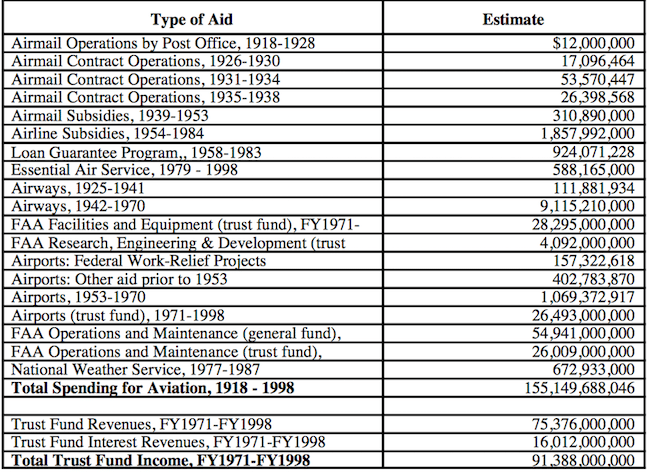WikiLeaks Disclosure Shows U.S. Airlines Received Billions in Subsidies
Skift Take
WikiLeaks did more than expose governmental eavesdropping and foreign policy blunders: A 2009 data dump is shedding new light on the spat between Delta, United, and American and the three largest Gulf carriers over government subsidies and Open Skies agreements.
The Business Travel Coalition, which backs retaining Open Skies agreements and is seeking to counter the U.S. carriers' charges that Emirates, Qatar, and Etihad received $42 billion in unfair government subsidies, uncovered a U.S. congressional report, disclosed by WikiLeaks in 2009, that documents how U.S. aviation, including commercial airlines, the FAA, and airports, received $155 billion in federal direct spending from 1918 to 1998.
That, of course, doesn't take into account any potential U.S. government subsidies to the aviation sector in the intervening 17 years or benefits from bailouts and bankruptcy proceedings, which the three U.S. carriers participated in during the 2000s.
WikiLeaks six years ago released the 20-page U.S. Congressional Research Service report [embedded below], which was dated February 3, 1999 and was never officially released.
While much of the federal direct spending is very old, dating to 1918 and was funneled to the FAA and not the airlines directly, a lot of it, including some of the $928 million allotted to the loan guarantee program from 1957 to 1984, went directly to the airlines.
The following chart summarizes the federal subsidies to the U.S. aviation industry:
Federal Direct Spending on Aviation, 1918 to 1998

"During its lifetime, the program authorized federal guarantees of up to 90 percent of private loans for the purchase of equipment by local, short-haul, and feeder air carriers," the 1999 congressional report states. "The program was instituted to help carriersreplace equipment with newer and lower cost operating equipment. The rationale for the program was that lower costs would likely reduce the amount of subsidy paid to the carriers by the Federal Government."
The FAA operations and maintenance fund attracted about one-third of the total federal government direct spending during the period under analysis, receiving nearly $55 billion.
“A central argument of some U.S. airlines seeking government protection from foreign competition is that the Persian Gulf States have been inappropriately and unfairly helping the Gulf carriers become established with financial aid. What this report shines a bright light on is the simple fact that government assistance has long been provided on a very large scale to airlines around the world, including in the U.S.,” stated BTC Chairman Kevin Mitchell.
"What’s more, the U.S. Government, fully cognizant of this reality, endorsed an Open Skies policy over two decades ago that, while it provides sufficient flexibility to deal with major market distortions, is not premised on the complete absence of government aid to aviation, much less on some subjectively-perfect level playing field,” Mitchell said.
In addition to federal subsidies, U.S. airlines also benefit from state subsidies. Unite Here, a union affiliated with the AFL-CIO, issued a report last month claiming that U.S. airlines receive state subsidies that it says amount to $1 billion a year.
The U.S. Travel Association, which is in lockstep with the BTC on the Gulf carrier subsidy issue, likewise points to what it sees as the hypocrisy of the U.S. airlines' position.
Executive Vice President for Public Affairs Jonathan Grella issued the following statement on a Congressional Research Service report, unearthed by the Business Travel Coalition via WikiLeaks, finding that U.S. airlines received $155 billion in federal subsidies between 1919 and 1998:
“The Big Three U.S. airlines have constructed themselves an enormous glass house, and their amnesia about their own subsidies has now cost them the credibility of their own core argument for breaking Open Skies agreements," stated Jonathan Grella, U.S. Travel's executive vice president of public affairs.
“This exposes the fiction that the U.S. airline cartel’s furious and expensive assault on Open Skies is about subsidies," Grella said. "We hope this prompts policymakers and the public to ask: OK, what’s really motivating the campaign to break these agreements? We hope there is something else to dissuade us from by far the most likely conclusion: the Big Three airlines hate competition, and rather than cope with it in the marketplace they will undertake extreme means to stamp it out politically."
The Partnership for Open and Fair Skies, the airline and union coalition fighting the Gulf carriers' subsidies, rejects the congressional report as "laughable."
“It is laughable that a two-decade-old unpublished paper examining U.S.aviation since 1918 is being trumpeted as ‘evidence’ that U.S. airlines are supported the way that the United Arab Emirates and Qatar routinely subsidize their airlines," said Jill Zuckman, Partnership for Open and Fair Skies spokesperson.
“This is a case of distract and dissemble," Zuckman said. "Funding for air mail, Post Office support, and the National Weather Service is a far cry from the well-documented $42 billion dollars in direct subsidies and other unfair state support the Middle East carriers receive.
“Even more preposterous, the vast majority of the so-called subsidy includes the entire annual budgets for the Federal Aviation Administration from 1958 to 1998 and the cost of building air traffic control towers decades ago. Calling FAA funding a subsidy for commercial airlines is akin to calling paved roads and traffic lights a subsidy for the taxi industry. In fact, U.S. airlines send billions of dollars to the federal government every year to cover the cost of aviation services.
“It is a shame that the U.S. Travel Association and the Business Travel Coalition are acting at the behest of funders friendly to the Middle East carriers and their governments, rather than in the best interests of American jobs, consumers and companies.
“It is time to ensure U.S. airlines and their workers are operating on a level playing field with their state-funded competitors in the Middle East. U.S. airlines shouldn’t have to compete with the treasuries of foreign governments who offer their state-owned carriers blank checks.”
[gview file="https://skift.com/wp-content/uploads/2015/04/1998-crs-study.pdf"]





